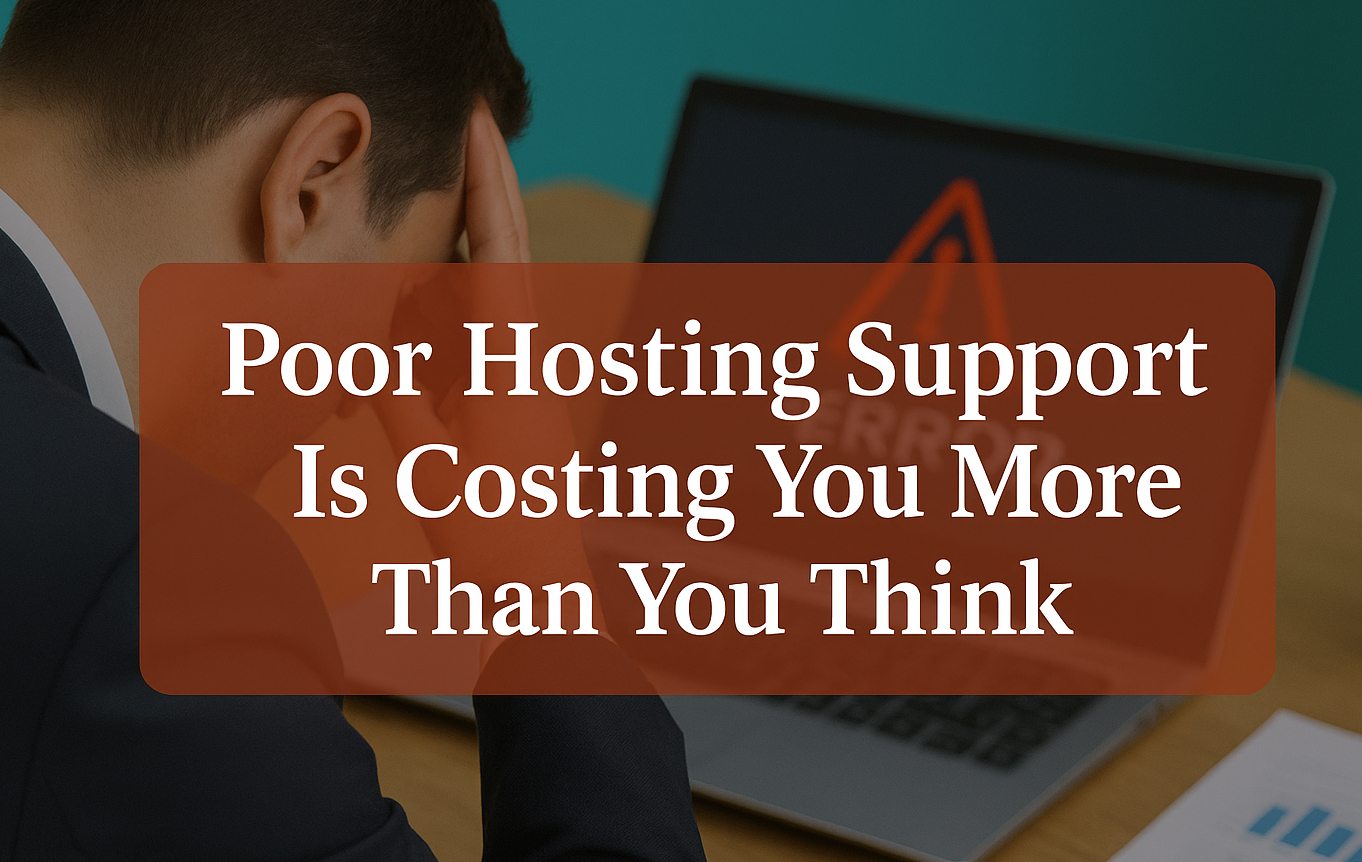 When Support Fails, Your Business Pays
When Support Fails, Your Business Pays
Behind every seamless online operation is a dependable hosting provider driving performance. But when that engine fails, the fallout can be brutal-missed sales, lost trust, and unnecessary chaos. Poor hosting support doesn’t just inconvenience; it actively undermines growth.
Poor Hosting Support Hurts Business
Budget hosting may seem like a smart move-low fees, decent specs, and the basics covered. But under the surface, you’re often paying in other ways: slow servers, poor hosting support, and chronic downtime.
Example: You snag a $99/month hosting deal for your eCommerce site. It crashes during a big weekend sale, and no one responds until Monday. You lose $30,000 in sales. That “cheap” option just got expensive.
Slow Response Times = Lost Revenue
When support lags, revenue drops. Every delayed ticket means transactions that don’t go through, users who abandon your site, and leads that never convert.
Example: A customer tries booking a session, but your site glitches. Your host hasn’t replied in 6 hours. By the time it’s fixed, they’ve gone elsewhere.
Downtime Destroys Customer Loyalty
Users expect sites to be up and responsive. Frequent outages drive people away-sometimes permanently.
Example: Your food delivery site crashes at dinnertime. Hungry customers turn to a competitor. Many won’t return.
SEO Takes a Hit When Servers Lag
Google penalizes slow or offline sites. Even if your content is top-notch, a sluggish server drops you in the rankings.
Example: Your blog is strong, but the server takes 7 seconds to load. Competitors with faster sites get ranked higher.
Security Risks Multiply with Delayed Support
Support isn’t just for speed-it’s for safety. Delays in patching vulnerabilities or addressing exploits can open the door to hackers.
Example: A known plugin flaw goes unpatched. Your site gets hacked, customer data is stolen, and your credibility takes a hit.
Wasted Time Means Wasted Money
Every time your team has to fix hosting issues themselves, that’s time not spent building your product or growing your brand.
Example: A developer spends a day fixing email issues instead of launching a feature that could generate revenue.
Support That Can’t Scale
A scalable hosting solution is essential to support the expanding demands of your business. If they can’t handle spikes or demand, you’re at risk.
Example: A viral launch crashes your site. Your host offers no immediate help. Momentum is lost. Sales suffer.
The Cost of Poor Communication
Unclear or copy-paste support responses drag issues out. You end up spending hours chasing fixes that should take minutes.
Example: You send a detailed ticket and get a generic reply. Five emails later, you finally get the right fix-wasting an entire day.
Reactive vs. Proactive Support
The best hosting support doesn’t just fix problems-it prevents them. Continuous monitoring with automated alerts minimizes downtime and enhances efficiency.
Example: A good host warns you of rising database usage. A bad one waits until your site crashes.
DIY Fixes Drain Your Team
When support fails, your staff takes over-googling solutions, editing config files, and hoping for the best.
Example: You spend hours debugging a PHP error your host won’t touch. One wrong change breaks everything, and you end up hiring a costly freelancer.
Emergency Fixes Aren’t Cheap
Last-minute assistance from third parties typically results in higher expenses.
Example: Right before a launch, your site crashes. You hire a $5,000/hour emergency developer. Crisis averted-but the bill stings.
Lost Sales During Peak Traffic
Promotions should boost profits-not expose your site’s weaknesses.
Example: Your floral shop site crashes on Valentine’s Day. Orders vanish. Competitors win.
Poor Hosting Hurts Performance Metrics
Slow pages lead to high bounce rates and poor ad conversion.
Example: An 8-second load time causes 85% of users to leave before engaging. Your ad budget bleeds with no return.
Increased Complaints and Refunds
Technical issues flood your support inbox and damage your reputation.
Example: Payment errors lead to refund demands and bad reviews. Your Trustpilot score tanks.
Brand Credibility Takes a Hit
Your site is your first impression. If it’s down, people don’t wait.
Example: An investor visits during downtime. They pass, citing “technical instability.”
Missed Business Opportunities
A slow or unreliable site can derail launches, campaigns, or investor meetings.
Example: Your webinar maxes out at 500 users due to hosting limits. Half your audience sees an error page.
Compliance and Data Loss Nightmares
Missed patches and backup failures can cost you regulatory fines-and customer trust.
Example: Backups silently fail. A ransomware attack hits. You pay the price-with no recovery plan in place.
The Emotional Toll on Your Team
Constant tech issues exhaust your staff. Burnout follows.
Example: After an overnight campaign launch fails due to downtime, your top marketing lead quits in frustration.
Growth Gets Stuck in the Mud
You can’t scale when you’re always fixing. Bad hosting stunts progress.
Example: Your SaaS app gains users, but slow response times scare them off. Growth stalls.
The Migration Mess
Moving hosts under duress is messy and risky.
Example: You switch providers mid-crisis. Data gets lost. Emails break. You’re down for 48 hours-and out of patience.
Choosing the Right Hosting Support
Prioritize hosts that offer 24/7 real-time support, scalable systems, and clear SLAs. Comprehensive support services contribute to both operational stability and strategic expansion.
Example: One business chose a host with proactive support. Traffic tripled during a sale. Everything ran smoothly, and they made record profits.
Grow Your Hosting Business, We’ll Handle the Support
With actsupport’s white-label web hosting support, you stay focused on growth-we’ll manage your customers
Conclusion: Invest in Support That Grows With You
Don’t gamble with your business. Effective hosting support contributes to growth rather than risk. Strategic selection drives digital success.Stay updated! Follow us on social media! Facebook, Twitter, LinkedIn
Check out our newest blog entry (Implementing Responsible AI with AWS)
Subscribe to get free blog content to your Inbox




